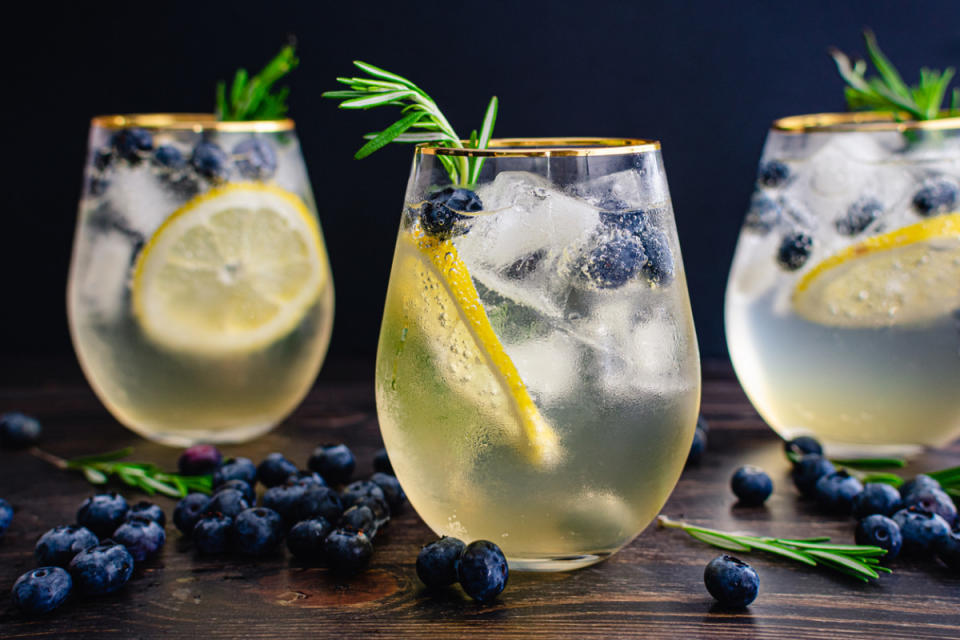That's the Spirit: 9 Different Types of Vodka, Explained

Pouring vodka shots
Without vodka we wouldn't have the Dirty Shirley, the trendy espresso Martini or the legendary massive comopolitan cocktail Ina Garten shared on her Instagram in April 2020. The clear spirit with the neutral flavor is a popular booze for cocktails because it plays well with many mixers, but not all vodkas are the same, which is why you'll see many different vodka brands at your local bar. There isn’t just one singular type of vodka, but different ones based on location and ingredients and which one you prefer depends on what you like and how you're using the spirit.
“It's all about creating a match made in *your* cocktail heaven," says Ashley Eldefri, brand ambassador for The Community Spirit Vodka. "Price is only sometimes an indicator of quality: Expensive doesn't necessarily mean better regarding vodka. It's always worth trying different brands and price ranges to find one you enjoy.”
To help you narrow down your choices and make your next trip to the liquor store a bit easier, we chatted with drink experts to break down 9 of the most popular types of vodka based on their ingredients, country of origin, flavor profile and more.
Related: 5 Different Types of Tequila, Explained

iStock
How is Vodka Made?
Making vodka has plenty of nuance, but for the purposes of this discussion, we'll try to distill (pun intended) it down for you. Vodka starts with your base ingredient (often a grain, though it could be potatoes or molasses), water and yeast. That mixture is fermented for a couple of weeks, then strained. The liquid from the fermentation process is distilled, filtered, diluted with water and bottled.
Related: 9 Popular Costco Liquors, Ranked From the Bottom(s) Up

iStock
9 Types of Vodka, Explained
1. Rye Vodka
According to Eldefri, vodkas made from grains, such as rye, deliver a spicier character with robust, earthy undertones. It’s generally on the leaner and drier side compared to other types of vodka.
When it comes to ordering cocktails, there are certain drinks rye vodka works particularly well in. “A dirty vodka martini, for example, will showcase the spirit itself, in which case a rye vodka, subtle and dry, will compliment the tangy hint of olive juice best,” says Alissa Marinello, bartender at New Jersey's Vivamee Hospitality properties, Renault Winery & Resort and LBI National.
2. Fruit Vodka
In this case, the vodka itself doesn’t come from fruit. The fruity flavor is added after the distillation process. “Many modern brands offer flavored varieties with additions of fruits or herbs infused after distillation,” says Eldefri. Some popular fruit vodka flavors include melon, strawberry, blueberry, lemon, raspberry, lime and orange.
Marinello recommends steering clear of artificial ingredients and dyes and doing a DIY flavored vodka. “Instead, pour any unflavored vodka in a jug with your fruit of choice,” she says. “It is best to let the vodka infuse for at least three days, and up to seven.” Strain the fruit-infused vodka into a jar or bottle and start shaking up cocktails!
3. Corn Vodka
While corn is a dinnertime favorite for many people, the sweet vegetable is also a popular vodka ingredient. “Corn-based vodkas are renowned for their mellow and slightly sweet profile, coupled with a velvety mouthfeel and notes of vanilla or buttery elements,” says Eldefri.
If you’re in the mood for a martini, Eldefri recommends using a corn-based vodka for a classic cocktail, like the martini, to allow the spirit to speak for itself.
4. Potato Vodka
Before you ask, no, potato vodka doesn’t taste like french fries or mashed potatoes. “Potato-based vodkas are cherished for their creamy, dense texture, imparting a subtly earthy and nutty flavor,” says Eldefri.
Potato vodka pairs exceptionally well with savory foods, including certain cheeses and meats, so you might want to keep that in mind the next time you’re eating out or hosting a dinner party.
5. Molasses Vodka
For a smooth vodka experience, try a spirit made from molasses. “Molasses-based vodkas, often linked to rum production, offer a slightly sweeter and more intricate taste, featuring hints of molasses and caramel,” says Eldefri. The caramely notes in molasses vodka make it nice in a creamy cocktail, like a white Russian.
6. Flavored Vodka
According to Marinello, flavored vodka is fun to work with because you can create more complex cocktails with minimal ingredients. That said, she says to steer clear of this type of vodka if you have a gluten allergy becuase sometimes artificial flavorings are added in post-distillation that can contain this common allergen.
In terms of the types of flavors, there is a wide variety, but many fall into the citrusy (lemonade, grapefruit) or fruity (strawberry, blueberry) categories.
7. Russian Vodka
In addition to the base ingredients, vodkas can vary based on where they're made because different areas are known for specific styles of the spirit. “Russian vodkas, traditionally crafted from wheat or rye and subjected to multiple distillations, are celebrated for their pure and smooth qualities,” says Eldefri. Some of the most popular Russian vodka brands include Beluga Noble, Husky, Marmot Siberian and Smirnoff.
8. American Vodka
Eldefri says that American vodkas span from smooth neutrality to a focus on unique flavors driven by various base ingredients. American vodka is generally made with rye, wheat, potato or corn to create a unique flavor profile with a velvety texture and earthy, warm taste. This will vary based on the bottle, but the best way to think about it is the best of both worlds made from different types of ingredients.
9. Polish Vodka
According to Marinello, Poland and Russia both claim ownership of introducing the first spirit. That said, Polish vodkas, made from potatoes or grains, offer a slightly more robust flavor with hints of earthiness or sweetness.
Up next: Celebrity Chef Pati Jinich's Simple Formula for Making the Perfect Cocktail
